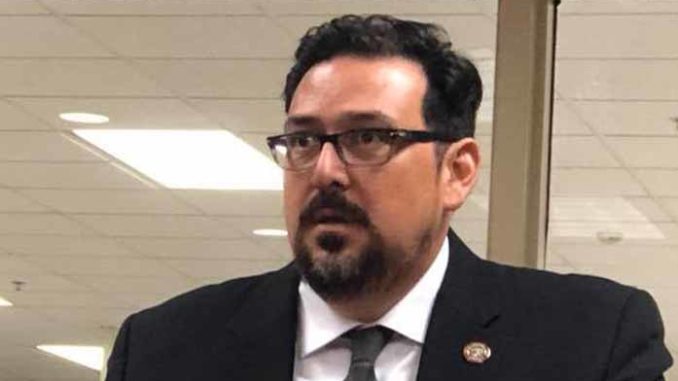
“The 2020 election in Maricopa County left significant holes to be answered and addressed.”
That is what Arizona Attorney General Mark Brnovich wrote in an Interim Report marking six months since Senate President Karen Fann referred several questions and concerns stemming from the Senate’s review of how Maricopa County conduced the 2020 General Election, particularly those activities led by then-County Recorder Adrian Fontes.
In the April 6 report, Brnovich noted his office has “reached the conclusion that the 2020 election in Maricopa County revealed serious vulnerabilities that must be addressed” and that it is imperative to strengthen the processes for handling and verification of early ballots before the 2022 elections.
“We can report that there are problematic system-wide issues that relate to early ballot handling and verification” in Maricopa County, including an early ballot signature verification system which “is insufficient to guard against abuse.”
In one example, Brnovich noted Maricopa County failed “in multiple incidents” to follow Arizona’s Elections Procedures Manuel when transporting early ballots from dropbox locations to the county’s election headquarters. The responsibility for early ballots falls to the County Recorder until the ballots are turned over to the Election Department for tabulation.
“It is estimated that between 100,000 and 200,000 ballots were transported without a proper chain of custody,” according to the report. As a result, the attorney general suggested the Legislature codify early ballot custody and transportation procedures by using guidelines published by the U.S. Election Assistance Commission.
After Fann reached out to the attorney general. Brnovich’s Election Integrity Unit (EIU) notified Maricopa County officials to preserve “all materials related to” three elections in 2020 – the Presidential Preference Election, the Primary, and the General.
As to the six-month lag from when Fann referred the matter to Brnovich’s office, the Interim Report notes that a request sent to Maricopa County last October for “all written procedures, policies, guidelines, and manuals” used during the 2020 General Election was not responded to until early February.
“The EIU’s initial review found several deficiencies, including Maricopa County’s failure to provide internal policies and procedures that had been disclosed to litigants in various court proceedings, but were noticeably absent from the document set,” the report notes.
A follow-up request in early March sought certain documents, such as polices and procedures, which Brnovich said were “known to exist, but not provided” by the county previously. Three such documents were turned over by Maricopa County on March 23, but the report notes there has been no disclosure of at least one other procedure followed by then-Recorder Fontes’ staff.
Brnovich also noted that civil and criminal investigations “of this magnitude and complexity take many months if not years to complete.” And he pointed out his staff has been hamstrung by a lack of civil subpoena power, something which would have been rectified if Sen. Kelly Townsend’s Senate Bill 1475 had been signed into law.
“Mail-in voting is and has been a facet of Arizona law, but the opportunity for fraud increases the moment a ballot leaves the protective custody of the election official and enters the postal system,” he noted. Although steps such Arizona’s ballot harvesting ban have been taken to reduce such fraud, Brnovich noted it is imperative for additional steps be taken.
“Requiring a match between the signature on the ballot affidavit and the signature on file with the State is currently the most important election integrity measure when it comes to early ballots,” Brnovich noted, adding that Arizona needs “stronger procedures in place for early-ballot signature verification, and those procedures need to be uniform across the state.”
During the 2018 General Election, Maricopa County received about 1.1 million early ballots, of which 307 were rejected for mismatched signature. Then in 2020, there were 1.9 million early ballots casts, from which Fontes’ staff rejected only 587 for mismatched signature.
By comparison, Pima County received 302,770 early ballots in 2018, of which 488 were rejected due to mismatched signatures. And in 2020, Pima County rejected 572 early ballots out of less than 430,000 ballots cast.
Brnovich noted that while there could be various factors to explain the significant difference, one explanation “is that Maricopa County became less diligent with signature review beginning in 2018” after Fontes took office.
The report also reaches three primary conclusions regarding signature verification of early ballots:
In the conclusion of his Interim Report, Brnovich noted that public confidence in the fairness of elections is paramount.
“As elected officials, we can, and must, do better for our constituents. Whether we agree with peoples’ reasons for questioning election integrity or not, we should go above and beyond our call of duty to assure Americans that each legal vote was counted, and no illegal votes were allowed,” he wrote. .
There is no set date for Brnovich’s next update to Fann. Until then, the AG;s investigation continues.
“The Office is still receiving new information that is relevant to its ongoing review of the Maricopa County election systems,” Brnovich wrote. “The Office is also reviewing newer analyses of early ballot signatures and potential ballot harvesting
